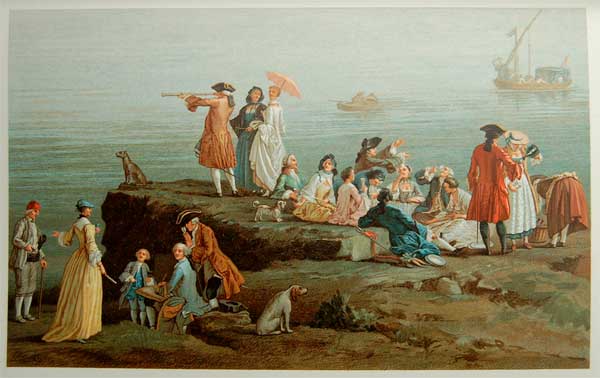T: I gather from the way people talk that the internet has affected these shows.
G: Of course. There doesn't seem to be the urgency to go to a show anymore, just as there's no urgency to go to the bookshop. Why go to a bookshop when you can go online and search for the books that you're looking for? Why go to Boston, fight the traffic, pay to park, get physically tired, when you can sit home in front of your computer?
Ah, but there's an answer to that. Using a computer, you will never think about the book that will captivate you, because you don't know it exists yet. Until you get into the shop and into the show and into those booths and start looking at those real books, you'll never discover the great thing -- because you don't know it exists.
T: Right. Like walking in here immediately I spotted a lot of books I never saw before. And I get excited holding these books that were completely unknown to me.
G: Right. You'd have to go through everybody's internet stock and download it record by record to see what's out there...and you'd have no visuals in most cases.
T: On the other hand, there have always been book catalogs.
G: There have been book catalogs. But shows are exciting because booksellers go to shows with fresh material, things they just bought. New stuff, interesting stuff is on display. Plus you get to see an assemblage of all these personalities, all these crazy quirky bookies who have no right to be in business. Most of them are terrible business people, but they love the book business for some reason. They show up with all this extraordinary material. To stop going to shows is crazy.
T: The last Burlington show -- not the one that was snowed out -- I talked to a lady who said she had been doing shows for twenty years and now she couldn't make a living at it. She was practically crying. I am wondering whether a lot of people are having that experience?
G: Sure. I think that the book business used to be easier. If something is easy, you don't really have to make an effort at it. It kind of falls into place for you. Even when the book business was easier, there were people who were more successful than others, because they worked harder at it.
T: Well, knowledge is a big part of it.
G: Knowledge was power, and still is power. Knowledge has been exploded by the internet. But I'm not so sure whether it's knowledge that has been exploded or just disjointed facts. In other words, you can google something and you can come up with some disjointed facts that may make that book more understandable to you, but that's not the same as knowledge where over the years you've learned certain things that make the attributes of that book self-evident to you. There's a big difference there.
Traditionally, booksellers all over the country had arcane knowledge about local material, or the material of a particular author or organization, or knowledge about bindings, printers, publishers and whatever. As they accumulated this knowledge, they were able to make more money. They knew what they were buying and they knew where to go with it.
T: So how many fairs a year do you do?
G: Between antique shows and book fairs, never less than 35 and as many as 45.
T: You do antique shows as well?
G: Yes.
T: The books you take to the fairs, do you keep them packed all the time?
G: No. Hence the fact that you get fresh stuff for every show.
T: And you buy at the shows as well.
G: I do.
T: What's the farthest you have traveled to a show.
G: I do San Francisco every year.
T: I thought every other year it was in Los Angeles.
G: Yes, but we do the off-year San Francisco show too.
T: Do you think book fairs are going to expand or stay the same?
G: There is a move within the ABAA to move to a higher end model, which I don't agree with. But there are a number of dealers in the ABAA who would feel very comfortable paying $10,000 for their booth, and having a smaller show. And display books in the multi-thousand dollar range.
T: That would be very exclusive.
G: Yes, it would. Currently the ABAA booth is $5,000 and change.
T: They'll probably have to do a background check to let you in as a customer!
[MORE]
